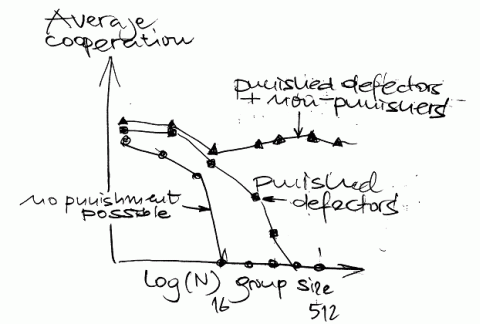if you want to see Crison and me in the same stadium, you must bid him slacken his speed to mine, for I cannot run quickly, and he can run slowly.
(from Platons Protagoras dialogue English|German).
firstmonday has a wonderful paper “More, Faster, Better: Governance in an Age of Overload, Busyness, and Speed” basically arguing that the vast sources of information has a rather paradoxical effect: the abundance of information rather disconnects and distances us from ourselves and the world around us.
Immersed in a sea of media, information sources, technologies and devices, many of us are now becoming aware of the downside — some would say the dark side — of these powerful new modes of communicating and acting.
The mere number of papers being published even in my most genuine area of interest is impossible to monitor at the end of 2006 – bioscience looses more and more scientia. Although papers still have a “discussion” section, there is no more discussion as references are getting more and more eclectic.
The Levy paper in firstmonday is a “must read” – in particular the chapter on
Vannevar Bush, an American born in 1890, was trained as an electrical engineer and for the first part of his career worked as a professor and an administrator at MIT…. Bush was famous enough to appear on the cover of Time in April of 1944. Yet today he is best remembered not for his technical work or his contribution to winning the war, but for an article he published in the Atlantic Monthly in July, 1945, titled “As We May Thinkâ€
and what he says about two kinds of thought: routine or repetitive or logical thinking along an accepted groove – literature scan, arithmetic operations all that technical stuff that can be automated: In contrast there is mature, creative thought, deep, original thinking, reasoning – without any mechanical substitute. Levy makes the point that
Certainly the easy availability of information and the increasing pace of life can at times be empowering and even exhilarating, but too much stimulation can lead to numbing, a loss of focus, and withdrawal: it can dumb down, enervate and even stupefy.
the information overload (with less reliable, often questionable) information leads to a deprivation of mature thinking that severely affects now the academic world
Yet today’s universities — their faculty, students, and staff — are increasingly caught up in the current cultural frenzy; academics are now busier and more overloaded than ever before. The pressure on faculty to obtain outside funding is intense and increasing as the pool of available funds shrinks; time spent searching for potential funding sources, writing grant proposals, and shepherding them through intricate bureaucratic procedures is simply added on to the other expectations of the job…. increased student expectations that instructors should and will be available for consultation at all hours of the day and night, weekends included. E–mail has also made professors that much more reachable by the general public, the press, and academics at other institutions…
What can be done? Prescreening of relevant science by (institutionalised) editors or (anarchic) blogs? And by which criteria?
CC-BY-NC Science Surf
accessed 18.02.2026
